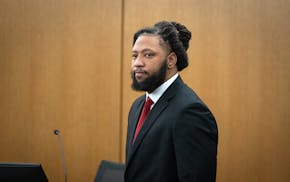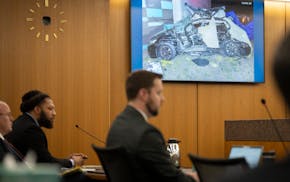Minnesota drivers for Uber and Lyft are pushing to change state law to allow them to form a union, one year after a deal was struck to prevent companies from following through on a threat to leave the state.
The drivers and DFL allies in the Legislature say without a union, the workers must return to lawmakers each year to try and raise their wages or increase worker protections.
"The issue here is that they aren't even able to negotiate with the companies about what their pay rates are going to look like or what better working conditions are going to look like," said Sen. Zaynab Mohamed, DFL-Minneapolis, who is sponsoring the measure.
"Moving forward, what does it look like five, ten years from now? Are these folks going to come here every year?"
The law passed last year in the session's final hours was heralded as the strongest worker protections for rideshare drivers in the nation.
It set minimum standards and pay rates statewide at $1.28 per mile and 31 cents per minute starting Dec. 1.
Lawmakers scrambled to pass the proposal after the Minneapolis City Council approved higher rates, which prompted Uber and Lyft to threaten to leave the state as soon as the ordinance took effect.
Freddi Goldstein, a spokesperson for Uber, said in a statement that "drivers, rideshare companies, and legislators worked collaboratively on addressing what drivers themselves established as their own priorities."
"It is not constructive to have late-to-the-game parties show up to risk what's been achieved to advance their own interests," she added.
Companies have said there are direct representatives that workers can collaborate with to handle any conflicts.
The rates passed in the new law were lower than what the drivers wanted, and some drivers said the companies delayed paying them higher wages. The law said the companies needed to pay the new rates within 14 days, according to Uber.
The new proposal is modeled after a union of rideshare drivers that recently formed in Massachusetts, the first state to allow the independent contractors to organize. Drivers can join the union by signing cards.
Drivers said they want a union in order to negotiate directly with the companies for higher wages, to contest deactivations and set other safety standards for workers.
Last year, the proposal threatened to upend the final days of the legislative session. The bill eventually passed out of a Legislature narrowly controlled by Democrats, but the political dynamics have shifted at the Capitol. Republicans currently control the House by a single vote and the chamber is expected to be tied after a March 11 special election to fill a vacant House seat in the Roseville area.
Bill sponsors said they want to start the conversation this year.
"We're coming back for this union and we have an opportunity to get this done," said Rep. Samakab Hussein, DFL-St. Paul.

Thompson found guilty of murder in car crash that killed 5 young women

University of Minnesota is putting its golf course up for sale
U proposes 7% cuts to academic programs, largest tuition hike in more than a decade

Jury reaches verdict in Derrick Thompson murder trial for crash that killed 5

